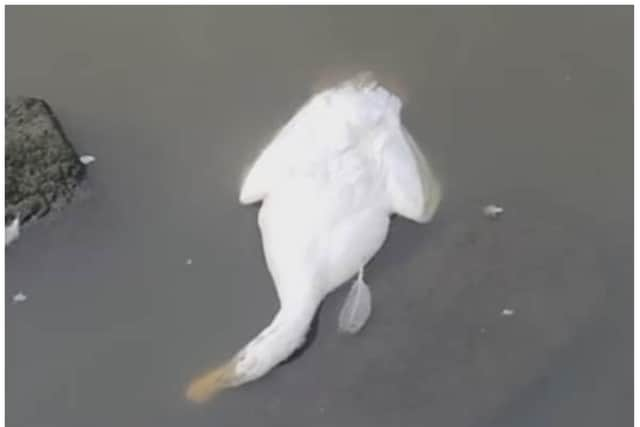More dead geese found at Doncaster park as bird flu warnings issued across city
and live on Freeview channel 276
The birds were found at Sandall Park earlier this week, following on from an incident in September when dead wildfowl were found in the park.
A spokesman for Friends of Sandall Park said: “Sadly there are a number of dead geese on the lake.
Advertisement
Hide AdAdvertisement
Hide Ad"Please don't feed the geese and ducks as this causes them to huddle together and therefore helps the spread of whatever virus they are contracting.


"We do not know what is causing this as yet.
"Please share, thank you."
In recent weeks, Doncaster Council has been erecting notices warning of avian flu at lakes and ponds across the city.
It comes after an outbreak of the deadly virus at Lakeside in Doncaster earlier this year with experts from DEFRA (the Department for Environment, Food and Rural Affairs) called in to investigate.
In January, it was confirmed that dead birds found at Lakeside at the end of December had tested positive for Avian Influenza (Bird Flu).
Advertisement
Hide AdAdvertisement
Hide AdDoncaster Council warned members of the public not to handle dead or dying birds and also to stay away from wildfowl droppings in the area.
The public can help by reporting sightings of dead birds by calling Doncaster Council on 01302 736000 and staff will come and safely remove them and contact DEFRA.
And last month a flock of 50 dead pigeons were reportedly found in a city street.
Sharing details of the grim discovery on social media, a woman said: “Just driven across the North Bridge to Halfords and the road - particularly around the pedestrian crossing – was absolutely littered in dead pigeons in the middle of the road, on the path and in the road gutters.”
Advertisement
Hide AdAdvertisement
Hide AdAround 48 millions birds have been culled across the UK and the EU in the last year as a result of the largest outbreak of avian flu on record.
In the UK, 161 cases of highly pathogenic avian influenza (HPAI) were detected in poultry and captive birds, leading to the culling of 3.2m birds.
That compared to the previous record of 26 cases in 2020/21.
The UK government said the culled birds were a "small proportion" of total production - about 20m birds a week.
Advertisement
Hide AdAdvertisement
Hide AdThere have also been 1,727 cases of avian flu in the UK's wild bird population, in 406 locations involving 59 bird species.
In previous years, the virus has mostly died out during the summer months but this outbreak has persisted year-round, with it proving more easily spread among bird populations.
Report dead wild birds
Call Defra on 03459 33 55 77 if you find:
one or more dead birds of prey
3 or more dead gulls or wild waterfowl (swans, geese and ducks)
5 or more dead birds of any species
You do not need to report any other found dead wild birds. Bird flu is not a notifiable disease in wild birds.
Advertisement
Hide AdAdvertisement
Hide AdIf you report a dead wild bird, Defra may arrange to collect and test it. This is to help explain where bird flu is spreading in Great Britain and in which birds.
Do not touch or pick up a dead or visibly sick wild bird.